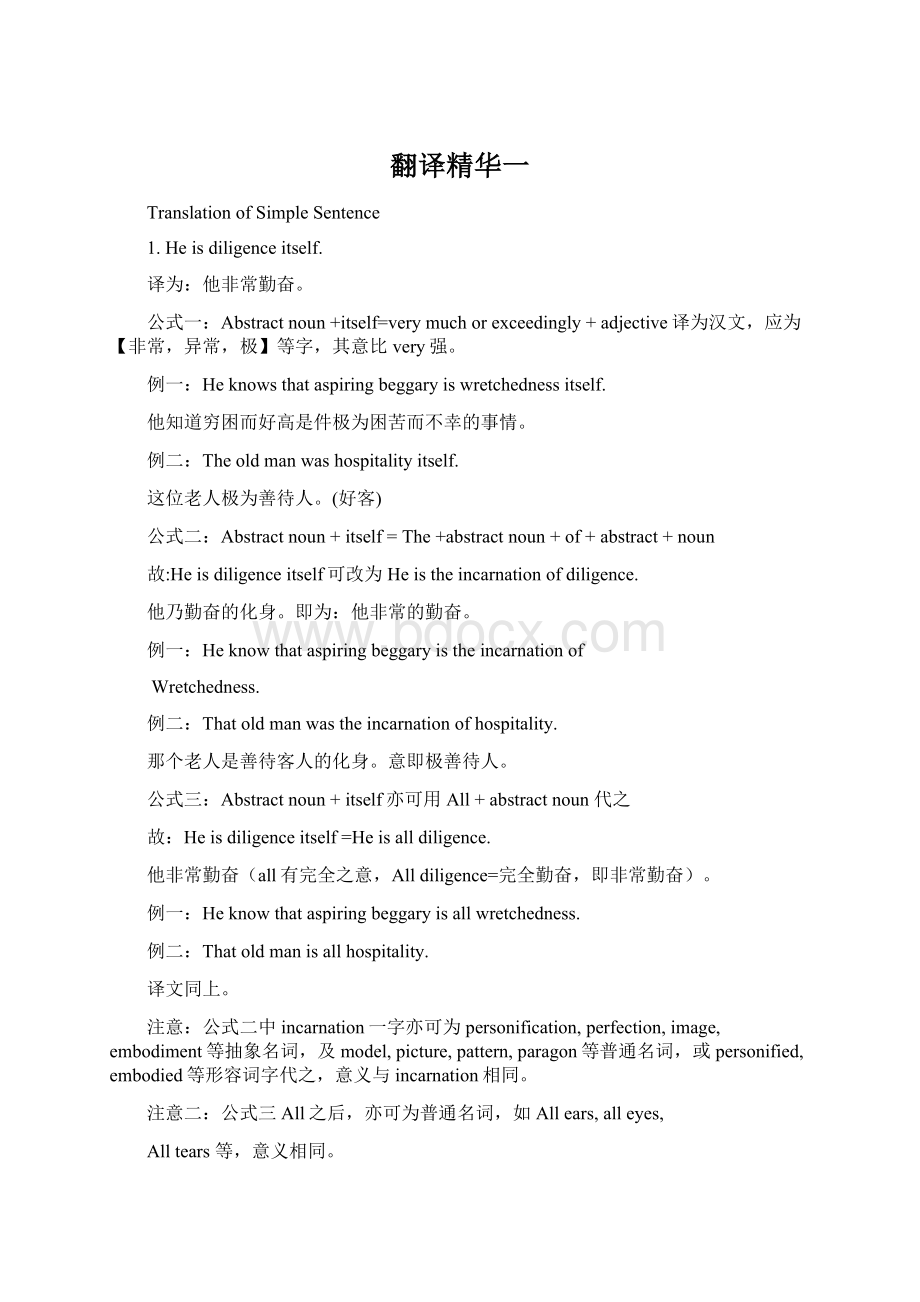翻译精华一.docx
《翻译精华一.docx》由会员分享,可在线阅读,更多相关《翻译精华一.docx(16页珍藏版)》请在冰豆网上搜索。

翻译精华一
TranslationofSimpleSentence
1.Heisdiligenceitself.
译为:
他非常勤奋。
公式一:
Abstractnoun+itself=verymuchorexceedingly+adjective译为汉文,应为【非常,异常,极】等字,其意比very强。
例一:
Heknowsthataspiringbeggaryiswretchednessitself.
他知道穷困而好高是件极为困苦而不幸的事情。
例二:
Theoldmanwashospitalityitself.
这位老人极为善待人。
(好客)
公式二:
Abstractnoun+itself=The+abstractnoun+of+abstract+noun
故:
Heisdiligenceitself可改为Heistheincarnationofdiligence.
他乃勤奋的化身。
即为:
他非常的勤奋。
例一:
Heknowthataspiringbeggaryistheincarnationof
Wretchedness.
例二:
Thatoldmanwastheincarnationofhospitality.
那个老人是善待客人的化身。
意即极善待人。
公式三:
Abstractnoun+itself亦可用All+abstractnoun代之
故:
Heisdiligenceitself=Heisalldiligence.
他非常勤奋(all有完全之意,Alldiligence=完全勤奋,即非常勤奋)。
例一:
Heknowthataspiringbeggaryisallwretchedness.
例二:
Thatoldmanisallhospitality.
译文同上。
注意:
公式二中incarnation一字亦可为personification,perfection,image,embodiment等抽象名词,及model,picture,pattern,paragon等普通名词,或personified,embodied等形容词字代之,意义与incarnation相同。
注意二:
公式三All之后,亦可为普通名词,如Allears,alleyes,
Alltears等,意义相同。
A,Thisstudentisallears(veryattentive),whenhelistenstotheteacher’slecture.
这个学生非常注意倾听教师演讲。
B,Amanwhoisalleyesandearstowardeverythingisinneedineverywalkoflife.
对于各事都非常注意谨慎者,无论何种职业都需用之。
C,Thiswomanisalltearswhenshehearsthedeathofhersoninthebattle-field.
这个女人听到她的儿子阵亡时泪流不止。
注意三:
Verb“tobe”之后,若用abstractnoun,必与itself连用,
否则即为错误,verb“tobe”之后,无论为noun或adjective,皆用以形容或限制句子在语法上称之为nominativecomplement而abstractnoun没有此用法故不可单独使用。
例如,Heisverydiligence就是错误的,因为diligence是抽象名词不能形容主语He,应该为HeisdiligentorHeisdiligenceitself,因为diligent是形容词,而diligenceitself=verydiligent.
Exercise1
1.Heishonestyitself.
2.Thepeoplearealleagernesstorestorepeaceintheir
country.
3.Heisallearstothespeechofthisfamousman.
4.Weyoungmenshouldbeallearstothenewand
Complicatedsocialphenomena.(note1)
5.Thatbeggarisalltearsashewalksalongthestreetasking
moneyfromthepassers-by.(note2)
NOTES
Note1:
Socialphenomena社会现象。
Note2:
Passers-by行人
2,Knowledgeisathinggoodinitself,butmaybecomeharmfulbyitsuse.
译为:
知识本位良物,能因用而致害。
公式一:
Initself=independently,ofextraneous含有不依靠外力的意思,译为汉文为[固,本来,即为]等。
例一:
Afinecourtesyisafortuneinitself.
娴雅之礼仪即财产也。
例二:
Initself=initsownnature意思是【本性】,即【本来,原是】故上句可改为Knowledgeisathinggoodinitsownnature,butmaybecomeharmfulbyitsuse.
例一:
Afinecourtesyisafortuneinitsownnature.
例二:
Moneyisnotabadthinginitsownnature,butmaybecomeharmfulbyitsuse.
注意:
Initself与Abstractnoun+itself意义不同,Initself=initsownnature指事物的本性,译为【固,本来,原为】等,Abstractnoun+itself=very=+adjective译为【非常,极】等。
注意二:
与initself相似的有ofitself,但是意思却不同。
Ofitself=naturally,spontaneously含有【不借外力】之意,译为【自,自然】等,例如Thedooropensofitself=门自己开了(不因外力而开)。
注意三:
与ofitself相似的还有ofone’sown,accord,含有【于自动】之意,译为【自动,自愿】等。
故ofitself大概用于无意愿物体,Ofone’saccord用于有意愿的物体。
例如:
Thewallfellofitself=墙自己倒了(不因外力而倒)
Thesoldierssurrenderoftheirownaccord.
士兵自动投降(出于他们的意愿)。
Exercise2
1.Weneednotseekforreputation,ifwefulfillourduty,reputationwillcomeofitself.
2.Athinggoodinitselfmaybecomeharmfulbyitsuse.
3.Charityinitselfisadmirable.
4.Studyhardandthedifficultwillreduceofitself.
5.Fireisaveryusefulthinginitself,butmaygiverisetogreatdamage,ifitisusedcarelessly.
(3)Helivesinthehousebyhimself.
译为:
他独居此室。
公式一:
Byoneself=separatefromothers含有与其他人分离之意,译为【独】字。
例一:
Helikestositbyhimself.
他喜欢独坐(by本意为【在旁边】,自己坐在自己旁边,即独坐。
公式二:
oneself=alone,故上句可改为Helivesaloneinthehouse.
例一:
Helikestositalone.
例Amanwillhavelimitedknowledgeandnarrowfieldofview,ifhelivesandstudiesalone.
注意一:
Byoneself有时亦作withoutother’shelp,译为【独为,独作】等,例如Iliketodoeverythingbymyself.无论何事,我喜欢独自为之。
注意二:
Byoneself作【独为】时,与foroneself意义相同。
故上句可改为Iliketodoeverythingformyself.
注一:
For之后若非CompoundPersonalPronoun,不是【独为】的意思,例如:
Iwilltrymybesttodotheworkforyou.译为:
我将尽最大努力为你办这件事。
Iwilldomybesttodotheworkformyself.我将尽最大的努力独自完成这件事。
注二:
For之后的CompoundPersonalPronoun若不是反指主语(doesnotrefertosubject),而是反指受词(butrefertoobject)时,当作foritsownsake(是他本身的原因),例如Weshouldpracticevirtueforitself=Weshouldpracticevirtueforitsownsake.
译为:
我们应该为道德之故而修养。
(而非为名誉或其他目的)
注意三:
CompoundPersonalPronoun有两种用法。
a.作反身之用(ReflexiveUse),即主句向本身做事。
(subjectdoessomethingtoitself)。
例如:
1Iliketodoeverythingby(orfor)myself。
(译见上)
2FormerlyTsengTseintrospectedhimselfthreetimesaday。
昔有曾子每日三省其身。
(注一)上二句中之myself及himself皆为反身之用,因其所指者与句主同一物也。
CompoundPersonalPronoun作此种用法时,可为句中动词之直接受词,或间接受词,或介系字(preposition)之受词(object)。
(注二)ReflexivePersonalPronoun若为“by”or“for”等介系字之受词时,“by”or“for”等字亦可省去。
故上例
Iliketodoeverythingby(orfor)myself亦可改为
Iliketodoeverythingmyself。
意义相同。
(注二)ReflexivePersonalPronoun不但用以反指句主,且辅助句之意义,故不省去。
若将上二例之myself及
himself省去,二句之意义皆不完矣。
b作加重语气之用(EmphaticUse)。
例如
Idoitmyself=余独自为之。
Myself一字,即用以加重语气,和使句主“I”字格外注重也。
(注)EmphaticPersonalPronoun可以省去,与原文之意无妨,不过语气稍弱耳。
故上例
Idoitmyself其中“myself”一字可以省去,意义无变。
(注意四)Byoneself作(在旁)解时,by时不可省去,亦不可用for代之。
Exercise3
1.Godhelpsthosewhohelpthemselves。
2.Amanmustdespisehimselfbeforeheisdespisedbyothers。
3.Tocheatothersistocheatoneself。
4.Hardastheworkis,heaccomplishesithimself。
5.Heisamiserandtriestokeepallthepropertyofhisfamilyforhimself。
NOTES
Despise轻视傲慢cheat欺诈accomplish成功Miser守财奴
(4)Youngmenaregenerallytooreadytospeakofthedefectofothers’.大概年轻人都爱讲别人的缺点。
公式一:
Youngmenaregenerallytooreadytogivethemselvesairswhentheygetlittlesuccess.
例二:
Heistooreadytocriticizeothers.
公式二:
Too+inclined+infinitive=too+ready+infinitive故本句可改为Yongmenaregenerallytooinclinedtogivethemselvesairswhentheygotlittlesuccess.
例一:
Too+aptorliable+infinitive=Too+ready+infinitive故上句可改为Youngmenaregenerallytooapttogivethemselvesairswhentheygetlittlesuccess.
例二:
Heistooapttocriticizeothers.
注意一:
Too……to中间用的字如果不是ready,inclined,apt,liable等字,则表示否定之意。
比较例子如下:
a,Heistooangertospeak.=Heissoangerthathecannotspeak.他太生气了以至于说不出话来。
Heistooreadytospeak=Heisverytalkative.他太好多言。
注:
a.句中too形容angry,tospeak形容too.前者表示因,后者表示果,与so+adjective+thatnot意义相同,故译为【太……不能】。
b.句中的too形容readytospeak,而tospeak形容ready,readytospeak意即【易于发言】,加上too之后,则为【太轻于发言或太易于发言】,故译为【多言】
注意二:
Too+adjective+infinitive之式,若加上【only,but】等字,也不是表示否定,仍表示【过度】之意,常译为【非常,甚,极】等字,例如:
a.Iamonlytoohappytohearyoursuccess.=Iamonlytoohappytohearyoursuccess.听到你成功的消息我非常开心。
b.Heisakindmaster,sohisservantsarebuttoohappytowaituponhim.他是一个和善的主人,所以他的仆人都喜欢等他。
注:
用only(orbut)+adjective时,语气比用very+adjective强,与verymuch+adjective相同。
注意三:
Onlytoo,buttoo,oralltoo+adjective其后如果不跟infinitive,表示【遗憾】含有alas的意思。
例如:
a.Theentertainmentendedonlytoosoon.
娱乐结束的太快了。
b.Anotheryearhaspassed,timefliesbuttoosoon.
一年又过去了,光阴流逝的太快了。
c.Thetimepassedalltooquicklyinthedimseclusionofonetheboxes.
住在这个幽暗隐居的小舍中,光阴流逝的如此之快。
注:
Too字不与infinitive连用,前面虽然不加only,but,all等字,亦可用以表示【遗憾】之意,例如:
Toooftenthemenofgreatabilityandknowledgeremainunknown.
注意四:
Too+adjectiveoradverbandknowledgeremainunknown.其式为none+too+adjectiveoradverb,表示【及时或不及】,含有汉文中【说时迟那时快】之意,译为汉文,应为【赶到】。
例如
Thearmywasonthepointofbeingdefeated,butnonetoosoonthereinforcementarrivedandturneddefeatedtovictory.
军队将败北时,援兵赶到,乃转败为胜。
Hewasnonetoosoberandhasahazyrecollectionofwhathesaw-Fred.M.White
翻译:
注意五:
Too字之习惯用法甚多,除上列者外尚有Too……notto表示不能之意。
Too…….notto表示必能之意。
Cannot…..too表示不为过之意。
Exercise4
1.Ignorant1menaregenerallytooreadytobelieverumors2.
2.Iamonlytoodelightedtoacceptyourinvitation.
3.Toooftenthetruth3ofmanythingsremainsunknown.
4.Thethiefwasonthepointofrunningaway,butnonetoosoonthepolicemenarrivedatthescene4andcaughthimaway.
5.Ishallbeonlytoopleasedtodomybestinthatline5ofwork.
(1.无智识的,愚昧的2,谣言3,真理4,场所5,种类)
(5)Thisdressistooshortforme.
(译)此衣吾着之殊短(这件衣服对于我觉得太短)
(公式)Too+adjective+for.表示【对于…..是太…..】之意,因介系字(preposition)“for”乃用以表示目的也;译时必先将for所示之目的语揭出。
例一,Thislessonistoohardforme。
此课我读之甚难(这个功课对于我觉得太难)
例二,Thisroomistoosmallforourmeeting。
我们在此室内开会觉得太小(此室对于我们开会觉得太小)。
注意一,Too+adjective+for之式,其中之adjective,亦可用adverb代之,其式为Too+adverb+for;例如,
Thismanprovestoomuchforme.
我非此人之敌(此人对于我强甚)。
注一,Toomuchforone乃一成语,意谓{强过,胜过}
注二,Too+adjective+for与too+adverb+for意义相同,然因英文文法上之关系而句法有别。
a.Too字前之动词若为Copula,其后必以adjective。
例如
Thethiefattemptedtoescapefromthepoliceman,butthepolicemanwastoomanyforhim.
贼人欲由警察脱逃,但警察力足以胜之。
b.Too字之前之动词若非Copula,其后必随以adverb;故上句policeman后之was若改为他种动词,其后必随以adverb。
例如Thethiefattemptedtoescapefromthepoliceman,butthepolicemanprovestoomuchforhim.(译同上)。
注意二,Too+adjectiveoradverb+for之前,有时冠以之数目译出。
例如
Thistable-clothisthreeinchestoowideforthistable.这个桌布铺在这个桌子上宽了三寸。
Lincolnwasaveryhonestman.Oneday,afterhesoldanarticletoaladyandfoundoutthathehadchargedhersixcentstoomuchforit,hewentthreemilestoreturnhertheoverpaidamount.林肯为人极诚实,一日,彼售物一妇人,其后觉察他向她多索价六分,于是步行三英里,还其多付之款。
EXERCISE5
1.Thisessayistoohardforthebeginners1.
2.Thisloadistooheavyforthisweakhorse.
3.Thiscarpet2isfiveinchestoowideforthefloor.
4.Jameswaswrestling3withJohn,butthelatterprovestoomuchfortheformer.
5.“Don’tgivetoomuchforthewhistle4”isaninvaln-ableadvicegivenbyFranklin5.
NOTES
1.初学者2地毯3角力4笛;笙5富兰克林
(6)Chinapossessesenormousquantitiesofcoal,andsheisrichinothermineralsaswell.
[译]中国产煤基地;他种矿产亦富。
(公式一)Aswell表示二物皆然或二者